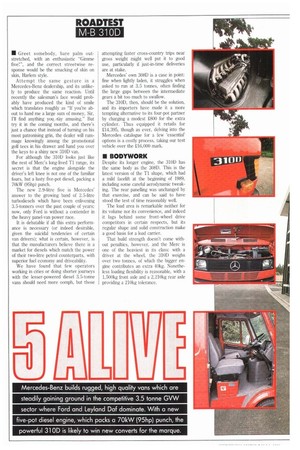Mercedes-Benz builds rugged, high quality vans which are steadily gaining
Page 36

If you've noticed an error in this article please click here to report it so we can fix it.
ground in the competitive 3.5 tonne GVW sector where Ford and Leyland Daf dominate. With a new five-pot diesel engine, which packs a 70kW (95hp) punch, the powerful 310D is likely to win new converts for the marque.
• Greet somebody, bare palm outstretched, with an enthusiastic "Gimme five", and the correct streetwise response would be the smacking of skin on skin, Harlem style.
Attempt the same gesture in a Mercedes-Benz dealership, and its unlikely to produce the same reaction. Until recently the salesman's face would probably have produced the kind of smile which translates roughly as "If you're about to hand me a large sum of money, Sir, I'll find anything yosily amusing." But try it in the coming months, and there's just a chance that instead of turning on his most patronising grin, the dealer will rummage knowingly among the promotional golf tees in his drawer and hand you over the keys to a shiny new 3101) van.
For although the 3101) looks just like the rest of Merc's long-lived Ti range, its secret is that the engine alongside the driver's left knee is not one of the familiar fours, but a lusty five-pot diesel, packing a 70kW (95hp) punch.
The new 2.9-litre five is Mercedes' answer to the growing band of 2.5-litre turbodiesels which have been enlivening 3.5-tonners over the past couple of years; now, only Ford is without a contender in the heavy panel-van power race.
It is debatable if all this extra performance is necessary (or indeed desirable, given the suicidal tendencies of certain van drivers); what is certain, however, is that the manufacturers believe there is a market for diesels which match the power of their two-litre petrol counterparts, with superior fuel economy and driveabitity.
We have found that few operators working in cities or doing shorter journeys with the lesser-powered diesel 3.5-tonne vans should need more oomph, but those attempting faster cross-country trips near gross weight might well put it to good use, particularly if just-in-time deliveries are at stake.
Mercedes' own 3081) is a case in point: fine when lightly laden, it struggles when asked to run at 3.5 tonnes, often finding the large gaps between the intermediate gears a bit too much to swallow.
The 3101), then, should he the solution, and its importers have made it a more tempting alternative to its four-pot partner by charging a modest £800 for the extra cylinder. Thus equipped it retails for £14,395, though as ever, delving into the Mercedes catalogue for a few 'essential' options is a costly process, taking our test vehicle over the £16,000 mark.
• BODYWORK
Despite its longer engine, the 3101) has the same body as the 3081). This is the latest version of the Ti shape, which had a mild facelift at the beginning of 1989, including some careful aerodynamic tweaking. 'The rear panelling was unchanged by that exercise, and can be said to have stood the test of time reasonably well.
The load area is remarkable neither for its volume nor its convenience, and indeed it lags behind some front-wheel drive competitors in certain respects, but its regular shape and solid construction make a good basis for a load carrier.
That build strength doesn't come without penalties, however, and the Mere is one of the heaviest in its class: with a driver at the wheel, the 310D weighs over two tonnes, of which the bigger engine contributes an extra 40kg. Nonetheless loading flexibility is reasonable, with a 1,500kg front axle and a 2,210kg rear axle providing a 210kg tolerance.




















































































































